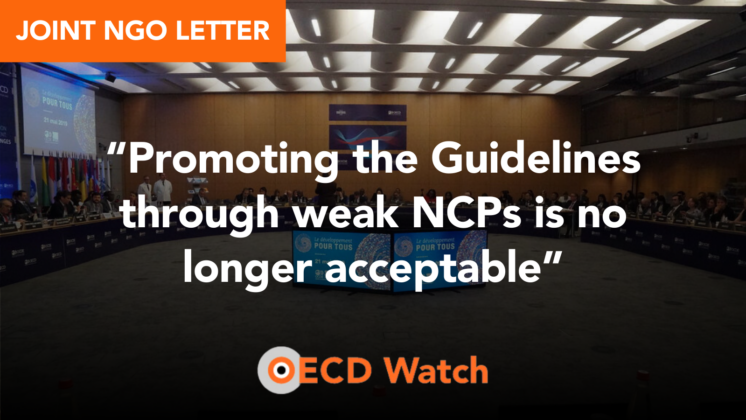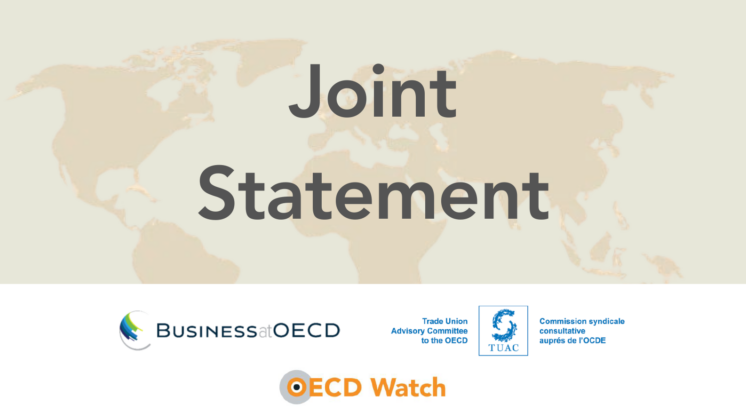Export credit agencies play a significant role in global trade – but their involvement in human rights and the environmental harm has often gone unchecked. The OECD is offering new footholds for accountability. Here’s what’s happening.

Export credit agencies (ECAs) collectively represent a leading source of public support for corporate industrial investments in the Global South.[1] They significantly promote foreign direct investment,[2] representing nearly USD 2.5 trillion in exports every year, or 13 percent of the world’s cross-border trade.[3]
But ECAs’ investments are also linked to a wide range of human rights, labour rights, and environmental abuses, as well as corruption.[4] Alleged harms include violations of land, health, and housing rights of Indigenous Peoples and other marginalized groups[5], forced labour, and child labour.[6] Furthermore, notwithstanding governments’ commitments under the Paris Agreement, ECAs collectively shell out tens of billions of dollars yearly to support climate-impacting coal, oil, and gas projects,[7] far more than other public finance institutions like the World Bank.[8]
Accountability gap
Despite the acknowledged link between ECAs and irresponsible business conduct, they often fall into an accountability gap. Here’s why: ECAs exist as something of a hybrid between a government and private entity. They usually report to national authorities, are enabled by a government legislative act, and can take various forms, ranging from a department of the state itself to a publicly-traded private corporation.[9] The capital of an ECA may originate from public budgets or premiums charged to clients, or both. Often disclaiming classification either as a state entity or multinational enterprise, ECAs can escape accountability under any system of governance, thereby denying remedy to impacted people.
Demand for justice
Over the past decade, various communities harmed by ECA-backed investments have filed complaints against those ECAs to several countries’ National Contact Points for Responsible Business Conduct.[10] National Contact Points are government-backed grievance mechanisms established to hear complaints against multinational enterprises alleged not to meet the standards in the OECD Guidelines for Multinational Enterprises on Responsible Business Conduct. The claims have been somewhat novel – arguing explicitly that ECAs are multinational enterprises (rather than state entities) covered by the OECD Guidelines.
Some of the National Contact Points receiving these complaints (e.g. the Netherlands) have agreed that their ECAs could be considered multinational enterprises covered by the Guidelines and subject to the National Contact Point complaint process. However, others (the United Kingdom, Finland, Korea, and recently the United States) have rejected the claims on jurisdictional grounds, asserting their ECAs are state entities and, therefore, not covered by the Guidelines or its complaint process.
Seeking clarification
Seeing the split in approach of these grievance mechanisms, in late 2021, OECD Watch and the Trade Union Advisory Committee (TUAC) – recognised representatives of civil society and unions, respectively, at the OECD – asked the OECD Investment Committee to weigh in: Can ECAs be multinational enterprises subject to the OECD Guidelines and National Contact Point complaints? When and how? And what if they aren’t considered a multinational enterprise?
Investment Committee’s clarification
In May 2024, after two and a half years of deliberation, the OECD Investment Committee answered. It concluded that the Guidelines can, in some instances, apply to genuine business activities of ECAs, based on a case-by-case analysis of the commercial nature of the ECA’s form, purpose, and activities.
The Investment Committee noted that ECAs incorporated as a commercial company or listed in a commercial register and ECAs whose charters, mission statements, or legal registrations include commercial objectives can be presumed at first instance to be multinational enterprises. This sets an initial threshold many governments must overcome to exclude their ECA from the Guidelines complaint process. The Committee also concluded that when its activities are commercial, even an ECA lacking a commercial form or purpose may still fall under the Guidelines. OECD Watch and TUAC have shown that many activities of ECAs closely mirror those of other commercial financial institutions and may, therefore, place them in the jurisdiction of Guidelines complaints.
But what if a National Contact Point considers its ECA a state entity rather than a multinational enterprise? Here, too, the Investment Committee offered valuable conclusions, noting that ECAs found to be state entities are still expected to meet the state duty, under international law, to protect human rights. Under the UN Guiding Principles, which in 2011 clarified international law on business and human rights, principles 1, 4, and 8 explain that governments (in this case, through an ECA) must prevent, investigate, punish, and redress human rights harms associated with the government itself or businesses supported by the government, such as with export credits. The UN Guiding Principles suggest ECAs should require due diligence by companies receiving export credits.
These conclusions from the OECD Investment Committee are impactful. They should, in practice, help set ECAs up for accountability in either National Contact Points or fora where states can be held accountable for human rights violations, such as national and regional human rights courts. At minimum, the Committee’s clarification should prompt States to do more to strengthen their ECAs’ human rights and environmental due diligence practice.
Within a broader context: the OECD increasing sustainability expectations for ECAs and states
The Investment Committee’s clarification comes as the OECD is elsewhere strengthening sustainability expectations for ECAs and states broadly.
In recent months, the OECD’s Export Credits Group has been updating the “Common Approaches”, an influential OECD Recommendation setting out measures states should apply to address environmental and social impacts of their export credits. The update should strengthen sustainability expectations for ECAs.
This week, the Export Credits Group is also working to negotiate an amendment to the OECD’s Arrangement on Officially Supported Export Credits to significantly limit adhering governments’ provision of export credit to the fossil fuel sector. If achieved, such an agreement would be a major step forward in establishing a more constructive role for export credit services in supporting the just transition. While agreement may not be reached, the very fact of negotiation on the topic is telling of a high-level shift in sentiment.
Meanwhile, in 2022 and 2023, the OECD Investment Committee issued a Recommendation and Declaration on the role of states in promoting responsible business conduct. Both call for the 51 governments that adhere to the OECD Guidelines to lead by example, including through their awarding of export credits and in other areas, such as trade, investment, and procurement.
So what’s next?
The winds are shifting for ECAs; that much is clear. In several workstreams, the OECD is pointing to a new path for sustainability – potentially limiting their investment in fossil fuels and promoting accountability for their harmful impacts, regardless of whether they operate as a state entity or multinational enterprise.
We now look to governments to adapt their internal policies to reflect these developments. As outlined in our joint statement and explanation (linked below), we urge National Contact Points receiving complaints against ECAs first to endeavour to hear the claims against their ECA as a multinational enterprise or, if not, to ensure clear sustainability recommendations to their ECA as a state entity. We also encourage the OECD to keep strengthening its policymaking on responsible business conduct – including by breaking down silos between committees and working groups active on export credit policy. The update of the Common Approaches is the most imminent opportunity: we urge governments to ensure coherence between the OECD Common Approaches and OECD Guidelines to promote a robust due diligence approach for ECAs.
Download our joint statement, detailed explanation, and original filing:
- OECD Watch and TUAC Joint Statement on Application of the Guidelines to Export Credit Agencies
- Explanation – OECD Watch TUAC Joint Statement – ECAs
- OECD Watch and TUAC Request for Clarification on Application of the Guidelines to Export Credit Agencies
[1] Global NAPs.org, available at https://globalnaps.org/issue/export-credit/.
[2] Finance and Trade Watch and CEE Bankwatch Network, ECAs go to market: A critical review of transparency and sustainability at seven export credit agencies in Central and Eastern Europe, December 2017, p. 13, available at: https://bankwatch.org/wp-content/uploads/2018/02/ECAs-go-to-market.pdf.
[3] CEE BankWatch Network, Export Credit Agencies, available at https://bankwatch.org/project/export-credit-agencies-ecas.
[4] See, e.g. ECA Watch, Publications by Issue, www.ECA-watch.org.
[5] See, e.g., complaints against various ECAs available at the OECD Watch complaints database, https://www.oecdwatch.org/complaints-database/?fwp_search_complaints=export&fwp_oecd_complaint_process_element=non-traditional-mne.
[6] See, e.g. Ending child labour, forced labour and human trafficking in global supply chains, ILO, OECD, IOM, UNICEF – Geneva, 2019, available at: https://mneguidelines.oecd.org/Ending-child-labour-forced-labour-and-human-trafficking-in-global-supply-chains.pdf
[7] See, e.g. Fossil Free ECAs advocacy campaign, available at www.fossilfreeecas.org.
[8] Price of Oil, “Public Enemies: Assessing MDB and G20 international finance institutions’ energy finance, April 2024, available at: https://www.oilchange.org/publications/public-enemies-assessing-mdb-and-g20-international-finance-institutions-energy-finance/.
[9] The websites of various ECAs involved in the OECD Export Credit Group can be accessed at https://www.oecd.org/trade/topics/export-credits/documents/links-of-official-export-credit-agencies.pdf.
[10] See footnote 6.













